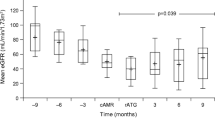Abstract
Chronic active antibody-mediated rejection (CAAMR) is a frequent cause of late graft loss. However, effective treatment for CAAMR after kidney transplantation has not yet been established. Here, we present the case of a kidney transplant recipient who recovered from CAAMR after administration of rabbit anti-thymocyte globulin. A 61-year-old man underwent ABO-compatible living-donor kidney transplantation for end-stage kidney disease; the kidney was donated by his wife. Five years after the transplant, the patient’s serum creatinine level and urine protein-to-creatinine ratio increased. He was subsequently diagnosed with CAAMR based on the kidney allograft biopsy and the presence of donor-specific human leukocyte antigen antibodies. Rabbit anti-thymocyte globulin treatment was administered following steroid pulse therapy. Subsequently, his serum creatinine levels and urine protein to creatinine ratio improved. There was also an improvement in the pathological findings seen on biopsy and the mean fluorescence intensity of donor-specific antibodies. In conclusion, this report describes the case of a kidney transplant recipient who developed CAAMR, treated using rabbit anti-thymocyte globulin. This strategy might be a viable treatment option for CAAMR after a kidney transplant.


Similar content being viewed by others
Abbreviations
- CAAMR:
-
Chronic active antibody-mediated rejection
- CMV:
-
Cytomegalovirus
- DSA:
-
Donor-specific antibodies
- eGFR:
-
Estimated glomerular filtration rate
- HLA:
-
Human leukocyte antigen
- IVIg:
-
Intravenous immunoglobulin
- MFI:
-
Mean fluorescence intensity
- MMF:
-
Mycophenolate mofetil
- mPSL:
-
Methylprednisolone
- PRA:
-
Panel reactive antibody
- rATG:
-
Rabbit anti-thymocyte globulin
- TAC-ER:
-
Extended-release tacrolimus
References
Bartel G, Schwaiger E, Bohmig GA. Prevention and treatment of alloantibody-mediated kidney transplant rejection. Transpl Int. 2011;24:1142–55.
Genestier L, Fournel S, Flacher M, et al. Induction of Fas (Apo-1, CD95)-mediated apoptosis of activated lymphocytes by polyclonal antithymocyte globulins. Blood. 1998;91:2360–8.
Préville X, Flacher M, LeMauff B, et al. Mechanisms involved in antithymocyte globulin immunosuppressive activity in a nonhuman primate model. Transplantation. 2001;71:460–8.
Mourad G, Morelon E, Noël C, et al. The role of thymoglobulin induction in kidney transplantation: an update. Clin Transpl. 2012;26:E450–64.
Pascual J, Zuckermann A, Djamali A, Hertig A, Naesens M. Rabbit antithymocyte globulin and donor-specific antibodies in kidney transplantation: a review. Transpl Rev. 2016;30:85–91.
Zand MS, Vo T, Huggins J, et al. Polyclonal rabbit anti-thymocyte globulin triggers B-cell and plasma cell apoptosis by multiple pathways. Transplantation. 2005;79:1507–15.
Cihan Y, Kanzelmeyer N, Drube J, et al. Rabbit anti-human thymocyte immunoglobulin for the rescue treatment of chronic antibody-mediated rejection after pediatric kidney transplantation. Pediatr Nephrol. 2017;32:2133–42.
Nanmoku K, Shinzato T, Kubo T, Shimizu T, Yagisawa T. Effect of rabbit antithymocyte globulin on acute and chronic active antibody-mediated rejection after kidney transplantation. Transpl Proc. 2019;51:2602–5.
Billing H, Rieger S, Susal C, et al. IVIG and rituximab for treatment of chronic antibody-mediated rejection: a prospective study in pediatric renal transplantation with a 2-year follow-up. Transpl Int. 2012;25:1165–73.
Billing H, Rieger S, Ovens J, et al. Successful treatment of chronic antibody-mediated rejection with IVIG and rituximab in pediatric renal transplant recipients. Transplantation. 2008;86:1214–21.
Bachelet T, Nodimar C, Taupin JL, et al. Intravenous immunoglobulins and rituximab therapy for severe transplant glomerulopathy in chronic antibody-mediated rejection: a pilot study. Clin Transpl. 2015;29:439–46.
Moreso F, Crespo M, Ruiz JC, et al. Treatment of chronic antibody mediated rejection with intravenous immunoglobulins and rituximab: a multicenter, prospective, randomized, double-blind clinical trial. Am J Transpl. 2018;18:927–35.
Gaston J, Erika D, Manel S, et al. Rituximab, plasma exchange and immunoglobulins: an ineffective treatment for chronic active antibody-mediated rejection. BMC Nephrol. 2018;19:261.
Issa NC, Fishman JA. Infectious complications of antilymphocyte therapies in solid organ transplantation. Clin Infect Dis. 2009;48:772–86.
Kidney Disease: Improving Global Outcomes (KDIGO) Transplant Work Group. KDIGO clinical practice guideline for the care of kidney transplant recipients. Am J Transpl. 2009;9:1–155.
Acknowledgements
We are grateful to Dr. Kyo M. for the discussions of pathological findings.
Author information
Authors and Affiliations
Corresponding author
Ethics declarations
Conflict of interest
The authors declare no conflict of interest.
Research involving human participants
All procedures performed in studies involving human participants were in accordance with the ethical standards of the institutional research committee at which the studies were conducted and with the 1964 Helsinki declaration and its later amendments or comparable ethical standards.
Informed consent
Informed consent was obtained from all individual participants included in the study.
Additional information
Publisher's Note
Springer Nature remains neutral with regard to jurisdictional claims in published maps and institutional affiliations.
About this article
Cite this article
Tanaka, R., Tsutahara, K., Inoguchi, S. et al. Clinical effect of rabbit anti-thymocyte globulin for chronic active antibody-mediated rejection after kidney transplantation. CEN Case Rep 11, 79–83 (2022). https://doi.org/10.1007/s13730-021-00633-7
Received:
Accepted:
Published:
Issue Date:
DOI: https://doi.org/10.1007/s13730-021-00633-7




